THE BOSTON STRANGLER: The Roots Of The Modern Serial Killer Movie?
Richard Fleischer is a director whose career is way overdue for a reappraisal. Though some of his films are acknowledged as classics - Narrow Margin and 20,000 Leagues Under The Sea are two good examples - he is often dismissed as a mere studio journeyman. Like any prolific director, he's got some duds in his back catalog (particularly during its final stretch in the 1980') but he's got an even bigger roster of impressive films to his credit from the 1950's through the 1970's.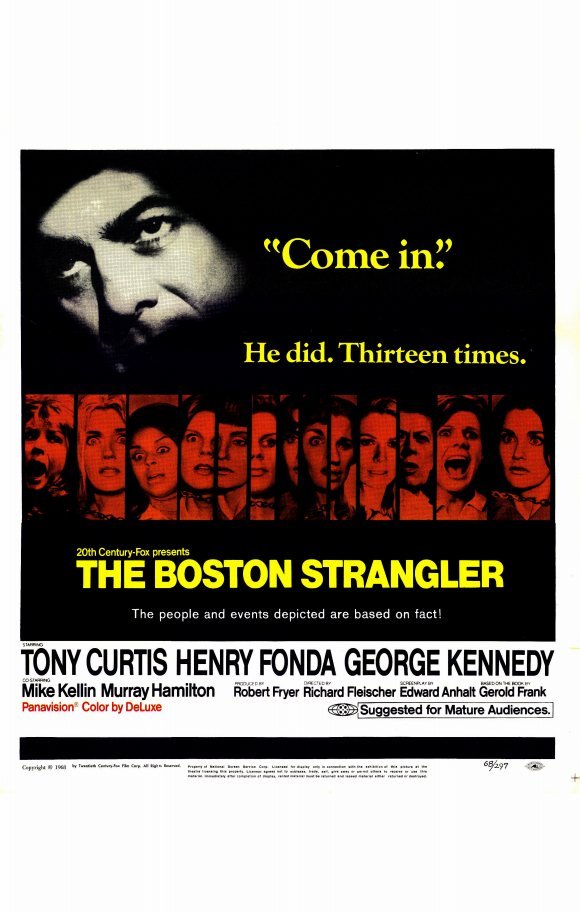 When Fleischer was paired with the right genre and the right script, he could really deliver. Genres he showed a special flair for include film noir (Violent Saturday), science fiction (Fantastic Voyage) and the action film (Mr. Majestyk).However, Fleischer's most unique genre skill was his ability to direct powerful true-crime fare about serial killers. For example, he crafted an excellent treatment of the Leopold-Loeb case in Compulsion and directed another factually-based cult fave in the chilling 10 Rillington Place. That said, his best work in this unusual subgenre is The Boston Strangler, an adaptation of Gerold Frank's nonfiction book on the case. From its casting to its visual approach, it remains an unorthodox and inspired piece of work.
When Fleischer was paired with the right genre and the right script, he could really deliver. Genres he showed a special flair for include film noir (Violent Saturday), science fiction (Fantastic Voyage) and the action film (Mr. Majestyk).However, Fleischer's most unique genre skill was his ability to direct powerful true-crime fare about serial killers. For example, he crafted an excellent treatment of the Leopold-Loeb case in Compulsion and directed another factually-based cult fave in the chilling 10 Rillington Place. That said, his best work in this unusual subgenre is The Boston Strangler, an adaptation of Gerold Frank's nonfiction book on the case. From its casting to its visual approach, it remains an unorthodox and inspired piece of work.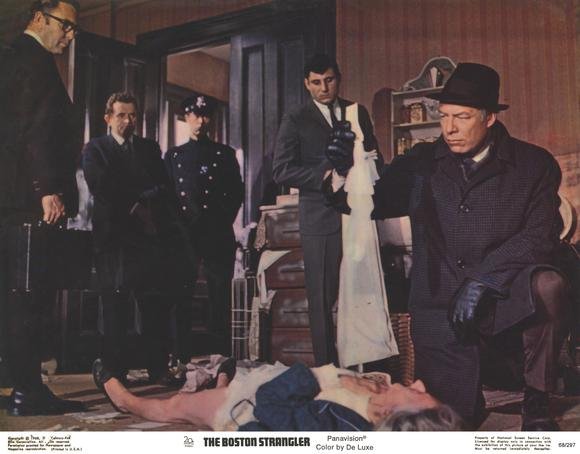 Like a true police procedural, The Boston Strangler starts with a crime, introduces the cops first and then works its way back to the killer. In 1963, Boston is terrorized by a series of murders. All the victims are women, all are sexually assaulted and the killer leaves a signature on the scene by tying a piece of a women's undergarment around the victims' necks. John Bottomly (Henry Fonda) is assigned to the case against his will and does his best to figure out the case using his analytical skills.
Like a true police procedural, The Boston Strangler starts with a crime, introduces the cops first and then works its way back to the killer. In 1963, Boston is terrorized by a series of murders. All the victims are women, all are sexually assaulted and the killer leaves a signature on the scene by tying a piece of a women's undergarment around the victims' necks. John Bottomly (Henry Fonda) is assigned to the case against his will and does his best to figure out the case using his analytical skills.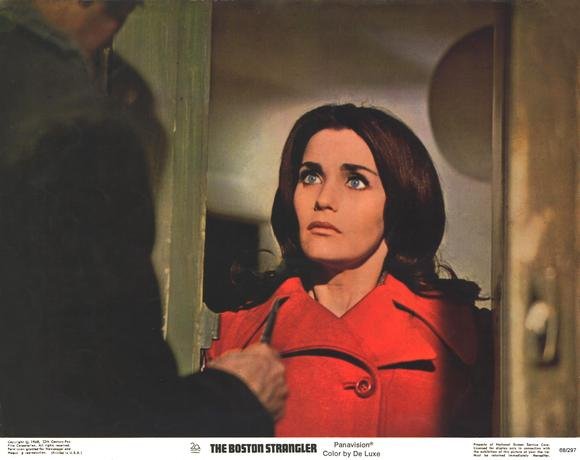 However, he doesn't get a break until the killer gets sloppy - at the point, we are introducer to Albert DeSalvo (Tony Curtis), a hard-working family man who is compelled to kill for reasons even he doesn't understand. De Salvo is finally caught when he slips up, though the evidence is weak... and this forces Bottomly to try an unusual gambit to get a confession out of De Salvo.
However, he doesn't get a break until the killer gets sloppy - at the point, we are introducer to Albert DeSalvo (Tony Curtis), a hard-working family man who is compelled to kill for reasons even he doesn't understand. De Salvo is finally caught when he slips up, though the evidence is weak... and this forces Bottomly to try an unusual gambit to get a confession out of De Salvo. This is an unusual structure for a Hollywood outing - and The Boston Strangler also gets an unusual visual approach to match it. Inspired by an art expo, Richard Fleischer chose to tell the story using a multi-panel split-screen for several sequences. Some critics decry this technique as mere flash but it actually does a fine job putting the viewer on edge - there's a great scene where a series of panels use p.o.v. camera angles to put the viewer in the killer's shoes - and thus allow the filmmaker's to convey the killer's off-kilter
This is an unusual structure for a Hollywood outing - and The Boston Strangler also gets an unusual visual approach to match it. Inspired by an art expo, Richard Fleischer chose to tell the story using a multi-panel split-screen for several sequences. Some critics decry this technique as mere flash but it actually does a fine job putting the viewer on edge - there's a great scene where a series of panels use p.o.v. camera angles to put the viewer in the killer's shoes - and thus allow the filmmaker's to convey the killer's off-kilter  mindset. The multi-panel technique is also used to great effect in a few scenes where it depicts how the murders cause panic to ripple through the Boston community.The Boston Strangler further benefits from strong performances. As usual, Fonda provides a classic Hollywood presence as the everyman-type struggling to come to grips with the case. His all-American appeal lends an element of comfort for the viewer that is sorely needed. He is backed up nicely by George Kennedy and Murray Hamilton, both effectively conveying the cynicism of cops with great credibility. There are also a few noteworthy cameos by actors playing
mindset. The multi-panel technique is also used to great effect in a few scenes where it depicts how the murders cause panic to ripple through the Boston community.The Boston Strangler further benefits from strong performances. As usual, Fonda provides a classic Hollywood presence as the everyman-type struggling to come to grips with the case. His all-American appeal lends an element of comfort for the viewer that is sorely needed. He is backed up nicely by George Kennedy and Murray Hamilton, both effectively conveying the cynicism of cops with great credibility. There are also a few noteworthy cameos by actors playing 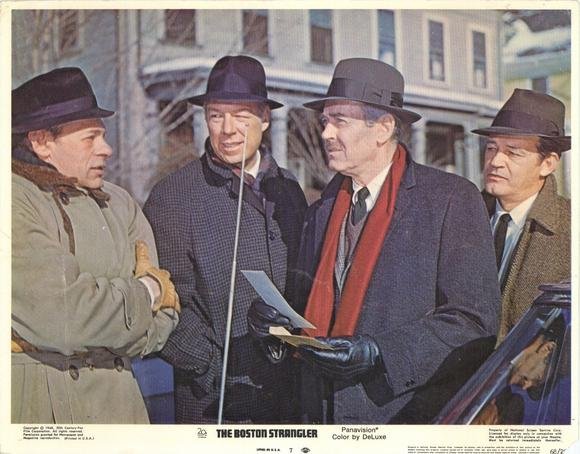 some initial suspects - the best is William Hickey as a tormented masochist whose odd behavior and obsessions makes him a suspect. His expression of hurt when he discovers he is a suspect is quite possibly the most heartbreaking moment in the film.Finally, and most importantly, Tony Curtis is a revelation as DeSalvo. Even though he doesn't make his first appearance until the halfway mark, he owns this movie. He digs into the role with Method-acting fervor, using well-crafted makeup to distort his matinee idol features and skillfully physicalizing the conflicted impulses of a man who has no idea why he is driven to kill. The film's
some initial suspects - the best is William Hickey as a tormented masochist whose odd behavior and obsessions makes him a suspect. His expression of hurt when he discovers he is a suspect is quite possibly the most heartbreaking moment in the film.Finally, and most importantly, Tony Curtis is a revelation as DeSalvo. Even though he doesn't make his first appearance until the halfway mark, he owns this movie. He digs into the role with Method-acting fervor, using well-crafted makeup to distort his matinee idol features and skillfully physicalizing the conflicted impulses of a man who has no idea why he is driven to kill. The film's 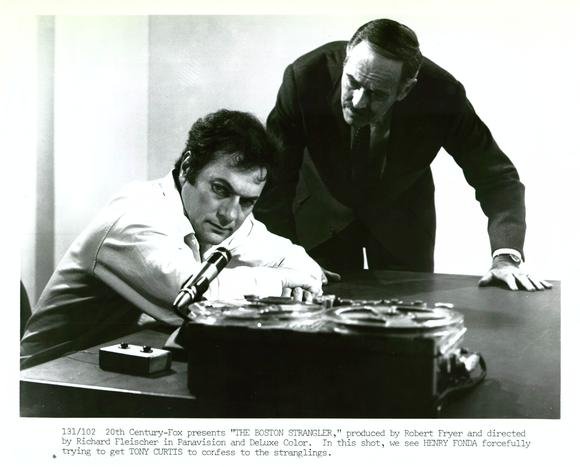 finale hinges entirely upon his ability to convey his ability to wordlessly convey this inner turmoil and Curtis pulls it off in a way that is unforgettable.Simply put, The Boston Strangler is a masterpiece that blends psychological realism and extreme visual stylization to powerful effect. Long before there was Silence Of The Lambs or a Seven, this movie conveyed the terrifying mindset of a serial killer with unflinching precision. It remains a necessity for students of the genre and one of finest achievements of a director who deserves more praise than he often receives.
finale hinges entirely upon his ability to convey his ability to wordlessly convey this inner turmoil and Curtis pulls it off in a way that is unforgettable.Simply put, The Boston Strangler is a masterpiece that blends psychological realism and extreme visual stylization to powerful effect. Long before there was Silence Of The Lambs or a Seven, this movie conveyed the terrifying mindset of a serial killer with unflinching precision. It remains a necessity for students of the genre and one of finest achievements of a director who deserves more praise than he often receives.


